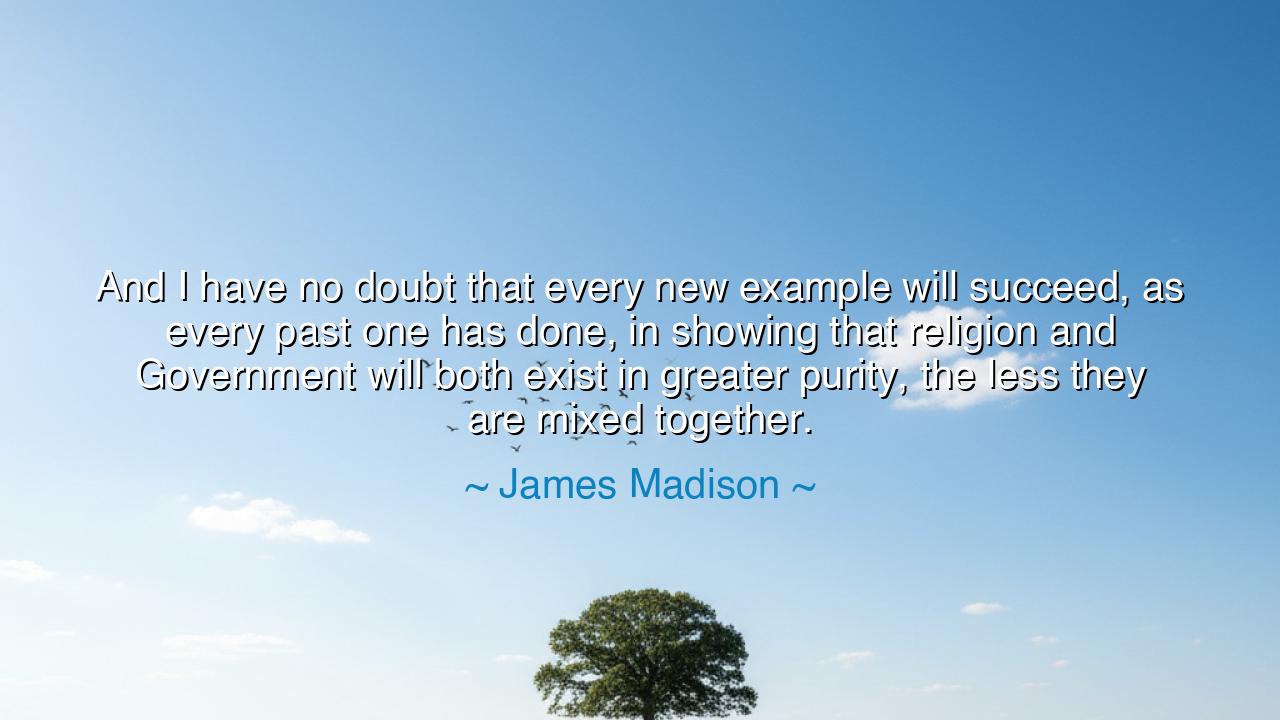
And I have no doubt that every new example will succeed, as every
And I have no doubt that every new example will succeed, as every past one has done, in showing that religion and Government will both exist in greater purity, the less they are mixed together.






"And I have no doubt that every new example will succeed, as every past one has done, in showing that religion and Government will both exist in greater purity, the less they are mixed together." Thus spoke James Madison, the philosopher of liberty and the architect of the American Constitution. In this profound declaration, he unveiled a truth as old as conscience itself — that both Religion and Government, sacred in their own realms, are corrupted when they entwine. For one belongs to the soul, and the other to the state; one answers to heaven, and the other to the earth. When they are joined, neither remains pure, and both lose the light that gives them meaning. Madison’s words are not merely political—they are spiritual wisdom, a safeguard for the freedom of both faith and law.
Madison had seen, in the history of nations, the ruin that follows when power and piety become partners in rule. Born in the shadow of monarchs who claimed divine right and churches that wielded the sword of the state, he knew that tyranny often cloaked itself in holiness. The Old World had bled for centuries under the wars of creed—the Inquisition, the Crusades, the persecution of heretics and reformers. From Europe’s ashes, the founders of America sought to build something purer—a nation where man might worship freely, not because the government permitted it, but because no government had the authority to forbid it. Madison, as the author of the First Amendment, laid down the cornerstone of that freedom: that religion must be left to the conscience of the individual, and government must serve without favor to any creed.
His insight was not born of disbelief, but of reverence. Madison did not deny the power of faith—he honored it. But he saw that when faith is wielded as a tool of government, it loses its sanctity and becomes an instrument of control. True religion, he said, needs no law to sustain it, for it dwells in the heart, not in the statute. Likewise, a just government needs no priestly blessing to command respect, for it earns its legitimacy through justice and reason. Thus, when each remains within its rightful sphere, both shine brighter: religion in its purity, guiding the soul; government in its integrity, guarding the peace.
History bears witness to this wisdom. In the time of the Puritans, men fled across the sea to escape persecution in Europe, yet soon after arriving on new shores, they too began to impose their doctrines upon others. The same flame that had warmed their faith now burned those who differed. Madison saw this irony and learned from it. He understood that liberty cannot be divided—that the chains used to bind one man’s conscience will, in time, bind all. Thus he wrote, not for his age alone, but for all ages: that the purity of both religion and government depends upon their separation, not their union.
Even beyond the borders of America, this truth has echoed. When nations have fused temple and throne, the result has been oppression and decay. Consider the decline of theocratic empires, where priests became politicians and rulers claimed divine sanction for every cruelty. Their power appeared eternal, but their foundations were dust. By contrast, the nations that have upheld liberty of conscience—where faith is free and governance impartial—have endured with greater strength and moral clarity. Madison’s words, therefore, are not merely American—they are universal law, written in the conscience of humanity.
And yet, his warning remains ever relevant. For the temptation to mix religion and power is subtle and enduring. In every age, there are those who would sanctify the state to advance their creed, or politicize the sacred to serve ambition. But each time, the outcome is the same: corruption of both realms. When the altar bows to the throne, faith becomes hypocrisy; when the throne bows to the altar, law becomes tyranny. Madison’s prophecy reminds us that freedom of belief is the wellspring of peace, and that the heart of faith must remain free to seek truth uncoerced.
The lesson is thus clear and eternal: if we wish our society to remain just, we must guard both the church and the state from the grasp of the other. Let the government protect the right to believe, but never dictate what must be believed. Let religion guide the conscience of man, but never command the hand of power. For in this balance lies the harmony of civilization—the coexistence of divine aspiration and earthly justice.
So remember the wisdom of James Madison, the humble visionary of freedom: that the purity of both faith and governance is found not in their union, but in their independence. Let each serve its sacred purpose—religion to uplift the soul, government to preserve the peace. And as long as this truth endures in the hearts of the people, both shall flourish—each noble, each pure, each shining more brightly for having left the other free.






AAdministratorAdministrator
Welcome, honored guests. Please leave a comment, we will respond soon